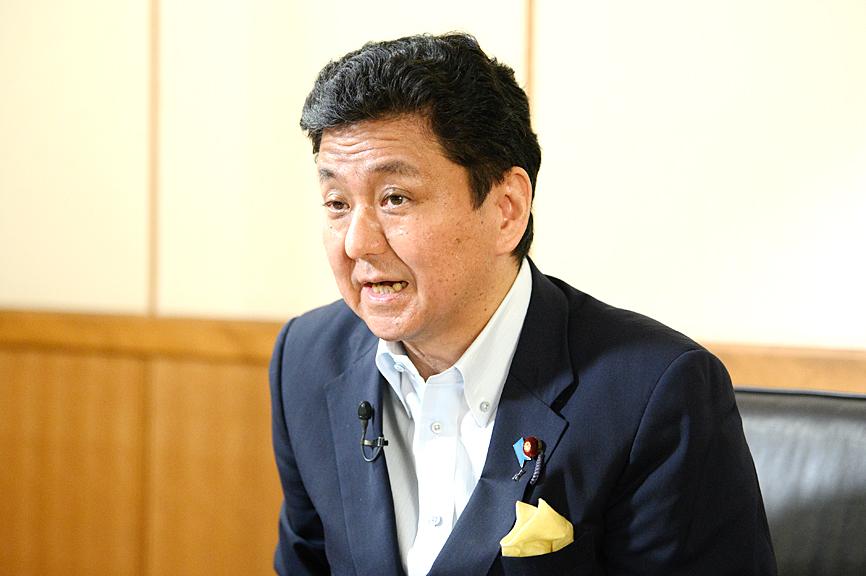The security of Taiwan is directly linked with that of Japan, Japanese Minister of Defense Nobuo Kishi said on Thursday, as tensions around Taiwan build up and its defenses are increasingly overshadowed by China’s military might.
The comments from a Cabinet minister known for his close ties to Taipei came a week after China sent 28 warplanes near Taiwan, in the latest ratcheting up of military pressure around the nation, 110km from Japan at its nearest point.
“The peace and stability of Taiwan are directly connected to Japan, and we are closely monitoring ties between China and Taiwan, as well as Chinese military activity,” Kishi said in an interview.

Photo: Bloomberg
“As China strengthens its military, its balance with Taiwan is tipping heavily to the Chinese side,” he said, adding that the gap is widening every year.
Taiwan is crucial for Tokyo, with the Luzon Strait to the south of Japan an important shipping lane for the energy tankers that resource-poor Japan relies on to power its economy.
On April 17, Kishi visited Yonaguni, the nearest Japanese island to Taiwan, and the Fuji News Network reported him as saying days later at a ruling party seminar that if Taiwan “turns red,” the situation might change drastically, and Japan needs to be ready for that.
The Chinese Ministry of Foreign Affairs called the comments reckless and irresponsible.
The younger brother of former Japanese prime minister Shinzo Abe, Kishi was among a group of lawmakers who visited Taipei last year to convey condolences over the death of former president Lee Teng-hui (李登輝).
Taiwan has become an increasingly important topic for the US and its allies, many of whom are concerned about China’s growing assertiveness near the country, whose semiconductor industry has become a linchpin of the global supply chain.
Japanese Prime Minister Yoshihide Suga and US President Joe Biden emphasized the importance of reducing tensions in the Taiwan Strait following their April summit, the first mention of the issue in a joint statement since 1969.
In the same statement, Japan, whose pacifist constitution leaves it heavily dependent on the US for its “nuclear umbrella,” vowed to bolster its own defense capabilities.
In other news, Japanese Minister of Foreign Affairs Toshimitsu Motegi yesterday said that Japan would soon give Taiwan a second donation of 1 million doses of the AstraZeneca COVID-19 vaccine.
The vaccines would arrive by the middle of next month, Motegi told a news conference, three weeks after Japan donated 1.24 million doses to Taiwan.
The donations are a gesture of gratitude for Taiwan’s aid to Japan in the aftermath of a devastating earthquake and tsunami that hit Japan in 2011, Motegi said.
The Ministry of Foreign Affairs in Taipei issued a statement, thanking Japan for its generosity.
Additional reporting by CNA

INVESTIGATION: The case is the latest instance of a DPP figure being implicated in an espionage network accused of allegedly leaking information to Chinese intelligence Democratic Progressive Party (DPP) member Ho Jen-chieh (何仁傑) was detained and held incommunicado yesterday on suspicion of spying for China during his tenure as assistant to then-minister of foreign affairs Joseph Wu (吳釗燮). The Taipei District Prosecutors’ Office said Ho was implicated during its investigation into alleged spying activities by former Presidential Office consultant Wu Shang-yu (吳尚雨). Prosecutors said there is reason to believe Ho breached the National Security Act (國家安全法) by leaking classified Ministry of Foreign Affairs information to Chinese intelligence. Following interrogation, prosecutors petitioned the Taipei District Court to detain Ho, citing concerns over potential collusion or tampering of evidence. The

NEGOTIATIONS: Taiwan has good relations with Washington and the outlook for the negotiations looks promising, Minister of Economic Affairs J.W. Kuo said Taiwan’s GDP growth this year is expected to decrease by 0.43 to 1.61 percentage points due to the effects of US tariffs, National Development Council (NDC) Minister Paul Liu (劉鏡清) said at a meeting of the legislature’s Economics Committee in Taipei yesterday, citing a preliminary estimate by a private research institution. Taiwan’s economy would be significantly affected by the 32 percent “reciprocal” tariffs slapped by the US, which took effect yesterday, Liu said, adding that GDP growth could fall below 3 percent and potentially even dip below 2 percent to 1.53 percent this year. The council has commissioned another institution

NEGOTIATIONS: The US response to the countermeasures and plans Taiwan presented has been positive, including boosting procurement and investment, the president said Taiwan is included in the first group for trade negotiations with the US, President William Lai (賴清德) said yesterday, as he seeks to shield Taiwanese exporters from a 32 percent tariff. In Washington, US Trade Representative Jamieson Greer said in an interview on Fox News on Thursday that he would speak to his Taiwanese and Israeli counterparts yesterday about tariffs after holding a long discussion with the Vietnamese earlier. US President Donald Trump on Wednesday postponed punishing levies on multiple trade partners, including Taiwan, for three months after trillions of US dollars were wiped off global markets. He has maintained a 10 percent

TRADE: The premier pledged safeguards on ‘Made in Taiwan’ labeling, anti-dumping measures and stricter export controls to strengthen its position in trade talks Products labeled “made in Taiwan” must be genuinely made in Taiwan, Premier Cho Jung-tai (卓榮泰) said yesterday, vowing to enforce strict safeguards against “origin laundering” and initiate anti-dumping investigations to prevent China dumping its products in Taiwan. Cho made the remarks in a discussion session with representatives from industries in Kaohsiung. In response to the US government’s recent announcement of “reciprocal” tariffs on its trading partners, President William Lai (賴清德) and Cho last week began a series of consultations with industry leaders nationwide to gather feedback and address concerns. Taiwanese and US officials held a videoconference on Friday evening to discuss the